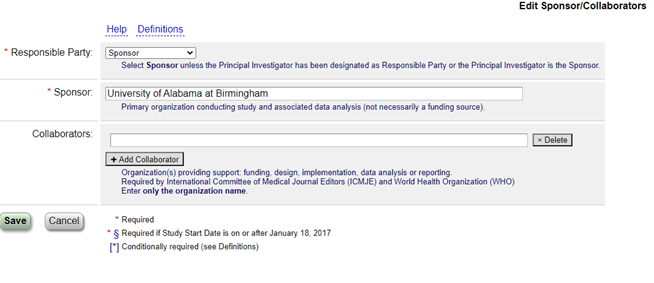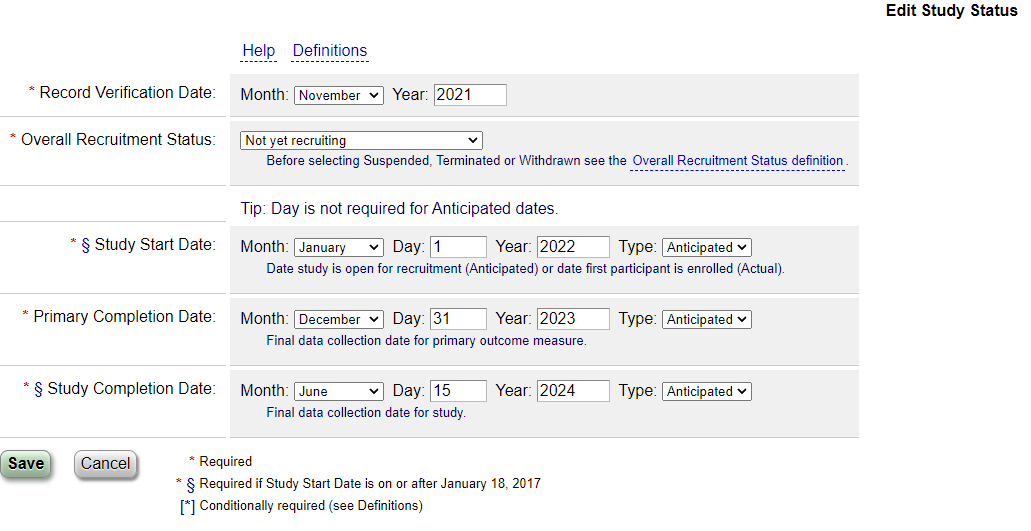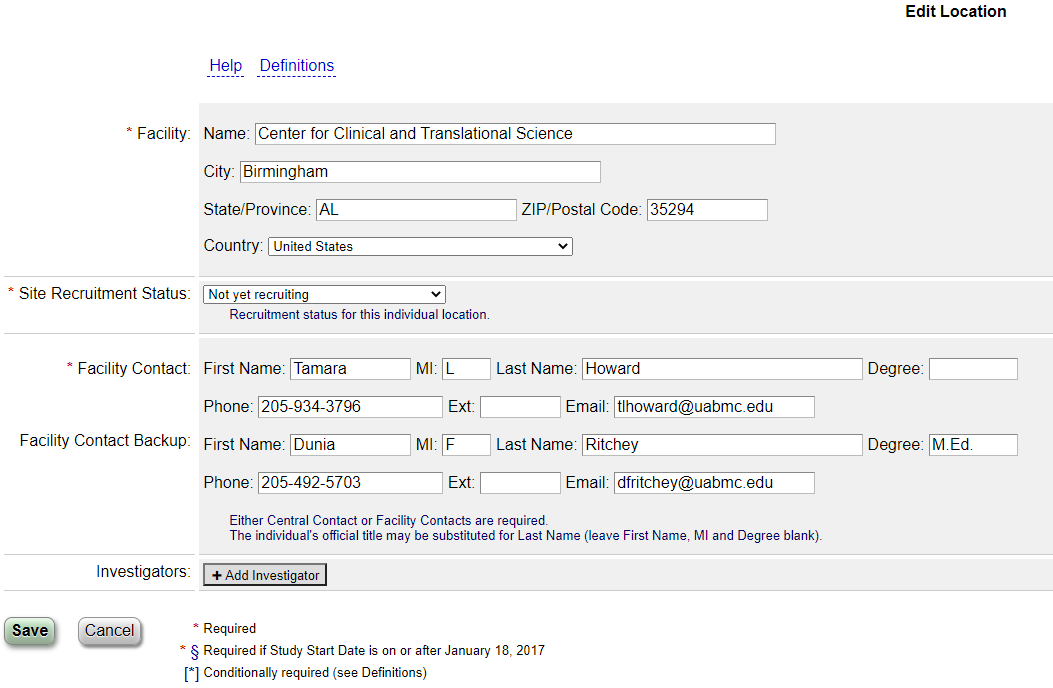-
PROBLEM 1: Not Starting Early Enough
Who: Record Owner or Responsible Party (i.e., PI, Research Coordinator, or Administrative Assistant, etc.)
What: Start the process of registering your trial on clinicaltrials.gov as early as possible!
Why: It can take up to two months to get an NCT number assigned by the PRS. That number is needed for the IRB submission and IND submission (if applicable). The earlier the trial is registered, the sooner the NCT number will be assigned.
How to Avoid: Begin the process of entering the study on clinicaltrials.gov as soon as there is a solid draft of the protocol. Update as necessary until the entry is fully complete and submitted for an NCT number.
-
PROBLEM 2: Responsible Party Not Entered
Who: Record Owner
What: The person registering the account is automatically assigned the Record Owner and should enter the PI as the Responsible Party for the study. The Record Owner can be a Research Coordinator, Administrative Assistant, etc. who will have access to the study on clinicaltrials.gov and has access to register the study and make updates to the record. The Responsible Party should always be the PI in charge of the study. Do NOT leave the Responsible Party blank as this will prevent the PI from approving and releasing the record. Other researchers, coordinators and staff can also be given access to the study as needed.
Why: Only the Responsible Party can Approve and Release edits to the PRS for review, and that person should only be the PI, as he/she is ultimately responsible for both the conduct of the study, and for confirming that the content on clinicaltrials.gov is complete and accurate. If the Responsible Party is left blank, the study can never be approved and released to the PRS and will delay PRS review.
How to Avoid: Fully complete the section for Responsible Party for the study.
How to Fix: Login to https://register.clinicaltrials.gov/ and follow the steps below:
- Click 'Open' next to Protocol Section
- Click ‘Edit’ next to Sponsor/Collaborators
- Change Responsible Party to Principal Investigator
- Select the PI’s Name and enter the PI’s Investigator Official Title. (i.e.: Associate Professor)
- Click ‘Save’
- Scroll up and click ‘Record Summary’
Then you can click ‘Entry Complete’, ‘Approve’, and ‘Release…’

-
PROBLEM 3: Not Updating Entry Regularly
Who: Record Owner or Responsible Party
What: Once an NCT number is applied to a study, the study requires some routine maintenance throughout the year. Studies are required to update the Record Verification Date a minimum of once a year, but it should also be updated anytime someone enters the record for any reason. Other updates should be done at key points, such as changing the Study Start Date when the first subject is enrolled, changing study status when recruitment begins or ends, or changing completion dates when the study closes. Other changes that should be entered regularly are changes to the enrollment status, study personnel, PI, sites or site personnel, or protocol.
Why: When the Record Verification Date passes, or when dates for Study Start, Primary Completion, or Study Completion are not updated, the record is flagged by the PRS as “Problem Record.” Problem records can reflect negatively on UAB and on the PI of the study, and they give incorrect information to the Public, so we try hard to keep all records current in every way.
How to Avoid: Mark the Record Verification Date in the study calendar, and make sure the date is updated each year. Make any study staff with access to the clinicaltrials.gov record aware that the Record Verification Date must be updated each time the study is opened on the site. Record the dates entered for Study Start, Primary Completion Date, and Study Completion Date, and update these as the study actually begins/end, or when the start or ending is delayed.

For Study Start, Primary Completion and Study Completion. Update “Anticipated” to “Actual” or change the date to a future date.



To update the enrollment status you must update both the Study Status section and the Contacts and Location section:


-
PROBLEM 4: Not Reporting Results on Time
Who: Responsible Party (PI), though the Record Owner can do the entering
What: Records are due no later than one year after Primary Completion Date (for an ACT). Results cannot usually be entered in one sitting; it often takes days or weeks to get everything entered correctly so don’t wait until the last minute. If it’s late, it’s late, even if by a few days.
Why: Studies with late results are flagged by the PRS and also by the FDAAA Tracker, and can result in fines imposed by the US Government. Late results can also impact a PIs ability to publish or to get new grant money. Please note – late results stay on the study’s record, even once the results are fully entered.
How to Avoid: Put a note in the study calendar to alert the team six months before results are due. Make sure all data analyses are completed in plenty of time, and that the study results section is begun early enough to complete, submit, and then address comments by the PRS. In extreme situations you can delay reporting result by submitting a Good Cause Extension prior to the deadline. (These are rarely approved and should only be submitted if a serious unavoidable problem occurs with the data or PI.)
-
PROBLEM 5: Changed Date Not Advanced Far Enough
Who: Record Owner or Responsible Party
What: Study Start, Primary Completion, and/or Study Completion dates are advanced a few weeks/months forward to avoid flagging a problem in the short term, but then not updated again when the new date rolls around, or requiring reminding from the Administrators to correct the date again.
Why: This often causes repeat work for the Administrators. We send an email reminder when the study has a due date coming in the next month. If the due date is only advanced by a few weeks, just to avoid the “problem,” we still have to contact the PI in a few weeks to remind him/her to update the new date.
How to Avoid: Set the most realistic dates possible as the Study Start, Primary Completion and Study Completion dates. Revise them whenever that information changes, and keep the dates flagged in the study calendar so the PI can proactively advance them or change them from Anticipated to Actual when the time comes. There is no harm in changing a date if the study has not yet begun or ended, but change it to a realistic date and follow up on that change. Do not simply advance the date one month just to put off dealing with the problem.
-
PROBLEM 6: Record Not Approved or Not Released
Who: Responsible Party
What: The “Approve” and/or “Release” buttons are not clicked after an update in clinicaltrials.gov.
Why: Only when the Responsible Party clicks both “Approve” and “Release” after an update in the study entry can the study be released to the PRS for review. The Record Owner can do a lot of things to update the study, but ONLY THE PI/RESPONSIBLE PARTY can Approve and Release. Records that are pending Approval or Release are flagged by the PRS as Problem Records.
How to Avoid: Responsible Parties (PIs) should get in the habit of clicking Approve and Release each time they are finished with their study updates. If a Research Coordinator of other staff has completed the actual updates, he/she can click “Entry Complete,” and notify the PI you have finished editing the record and it is ready for review, but the PI should be attentive to that person’s request to Approve and Release the study.
Entry Complete can be done by the PI of the person updating record.

Approve and Release must be done by the PI.

-
PROBLEM 7: Ignoring Emails
Who: Anyone who receives and email from the clinicaltrials.gov Administrators or the PRS system.
What: Emails are sent from the CCTS Clinicaltrials.gov Administrators, as well as directly from the PRS system to notify PIs of impending due dates and/or problems in their record. PIs and Research Coordinators sometimes ignore these emails, do not respond, and do not take action on the required updates.
Why: The emails are sent to remind PIs of an impending due date. Ignoring them creates more work for the Administrators and means PIs aren’t getting their studies updated as required. When these due dates pass and the PI has not completed the updates, the study is flagged as a Problem Record. That does not look good for the PI or for UAB. In addition, periodic reviews by the NIH that show the PI in a Problem Record state could jeopardize future funding opportunities for that PI.
-
PROBLEM 8: Leaving UAB or the Department with Transferring the Record
Who: Anyone attached to the study in clinicaltrials.gov
What: When study staff changes departments, retires, or leaves UAB, the clinicaltrials.gov record must be updated to assure continued access to the entry by the correct people. This is especially crucial with the PI/Responsible Party leaves UAB. In that case, the study must either be transferred to the new institution, or must be transferred to another PI at UAB. If the Record Owner leaves the study, department, or UAB, the Record Owner must be changed to another staff member. If staff leave who previously had access to the study, they should be removed from the study, and new staff added as needed.
Why: When an Administrator attempts contact regarding an upcoming due date, she only has the information available in clinicaltrials.gov. That information must be kept up to date. More importantly, the PI, as Responsible Party, is the only one who can Approve and Release updates to the study. If the Responsible Party leaves UAB without assigning a new Responsible Party, or transferring the study to his/her new intuition, the study is at a stand-still, and no one can finalize updates. That will eventually flag as a Problem Record, and will stay on the Problem Record list because it cannot be resolved. That negatively impacts UAB and the PI, even if the PI is no longer working on the study. This is also puts added pressure and frustration on your colleagues if a PI leaves without transferring his/her record properly.
How to Avoid: Regularly updating the clinicaltrials.gov entry can assure that the necessary personnel always has access to the study, and that no one who should no longer have access does. PIs should be diligent about closing or transferring all studies BEFORE they leave UAB. Studies should either be transferred to another PI at UAB, and that contact information updated in clinicaltrials.gov, or the study should follow the PI to his/her new institution with an appropriate transfer in the PRS system.
Clinicaltrials.gov – Avoiding the Eight Most Common Problems
Dunia Ritchey and Tamara Howard, leaders in the CCTS Clinical Research Domain and experts in the ClinicalTrials.gov landscape, have created this resource to help avoid the most common stumbling blocks in registering a trial with ClinicalTrials.gov. Click through the tabs below to explore each issue. Need more help? Contact This email address is being protected from spambots. You need JavaScript enabled to view it. to connect directly with the clinicaltrials.gov team.